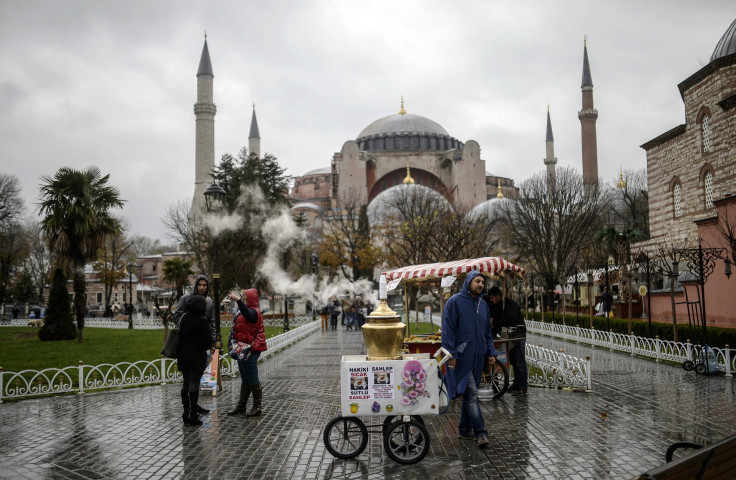Istanbul Suicide Bombing: Eastern Mediterranean Violence Could Send Tourists Westward

Tuesday’s suicide bombing in the heart of Istanbul’s tourist center that killed 10 German visitors couldn’t have happened at a worse time. The attack came less than seven weeks after Russia imposed trade and travel sanctions against the country in response to the shooting down of its fighter jet near the border with war-wracked Syria.
The sanctions, along with the civil war raging just to the south and mounting internal unrest, have hit Turkey’s tourism sector on multiple fronts, with losses to the industry last year estimated to be as much as $11 billion.
After a record number of foreigners visited the historically diverse gateway to Asia in 2014 — nearly 37 million — statistics due out later this month will likely show a drop in 2015 for the first time in nine years as Russians, who traditionally make up the second-largest group of foreign visitors after Germans, find alternative vacation destinations, such as Bulgaria.
The suicide attack near Istanbul’s scenic Blue Mosque, blamed on a 28-year-old Syrian with ISIS links, adds to mounting security concerns in the world’s sixth most-visited country. Between Tuesday and recent attacks against foreigners in Egypt and Tunisia, the Eastern Mediterranean is becoming more like a place to avoid. And travel industry watchers say 2016 could see tourists taking security concerns more seriously.
“Bookings for Tunisia, Egypt and Turkey are down significantly,” Paul Needham, editor of Frankfurt-based travel industry website fvw.com, said in an email. “The attacks in Hurghada [Egypt] and above all in Istanbul mean that there is likely to be a further slump for these two destinations.”
One country’s loss in visitors, though, is potentially another country’s gain.
“Egypt and Tunisia will suffer in the short term, but Spain and Greece will benefit as a result,” Annebeth Wijtenburg, spokeswoman for the London-based World Travel & Tourism Council, said in an email.
Tourists, it turns out, are far more likely to return to a country that witnesses a high-profile attack on travelers than other types of calamities.
According to research on tourism numbers following major events, put together by the World Travel and Tourism Council, it can take nearly two years on average for destinations to lure back visitors following a disease outbreak or an environmental disaster, and nearly 27 months to recover from a military coup or other forms of political unrest. But following high-profile attacks against foreigners like the one in Istanbul, lost tourism traffic is usually recovered in about 13 months.
The WTTC found the recovery time also varies on a general perception of security for a particular destination. For example, the March 11, 2004, Madrid train bombings had almost no impact on tourism, with about 2,000 trip cancellations. But Indonesia lost nearly 900,000 tourists following the 2002 Bali bomb attacks even though the death toll of 202 was only slightly higher than the 191 killed in Spain.
Alan Fyall, professor of tourism marketing at Rosen College of Hospitality Management at the University of Central Florida, said recent tumult in Egypt, Tunisia and Indonesia will see more travelers sticking to places perceived as having a low risk of attacks. And Mediterranean cruise lines tend to see an uptick in bookings, too. He also said countries tend to recover quickly from isolated attacks against foreigners if those attacks are thought to be one-time events.
“The frequency of the events is what engraves in people’s minds. When the attacks keep happening, people will say, ‘We’ve been to Spain 20 times before, but let’s go again because it’s safe,’ ” Fyall said. “As long as attacks on tourists don’t keep happening, tourism can recover fairly quickly.”
Indeed, according to ForwardKeys, a travel industry analysis firm, travel bookings to Tunisia plunged nearly 45 percent in the three weeks after the March 18, 2015, Bardo museum attack. And as traffic began to recover, a repeat attack on foreign tourists nearly three months later sent tourism traffic even lower. By the end of the year, bookings to Tunisia remained well below the initial dip that followed the March attack.
So who are the first tourists to return to a place that’s been hit with violence? Fyall said they tend to be eccentric travelers.
“The first tourists to return tend to be people like crazy professors, or people with particular interests in things like genealogy or archaeology," Fyall said. "They tend to be more immune to what’s happening in a country because they’re focused on other things.”
© Copyright IBTimes 2024. All rights reserved.












